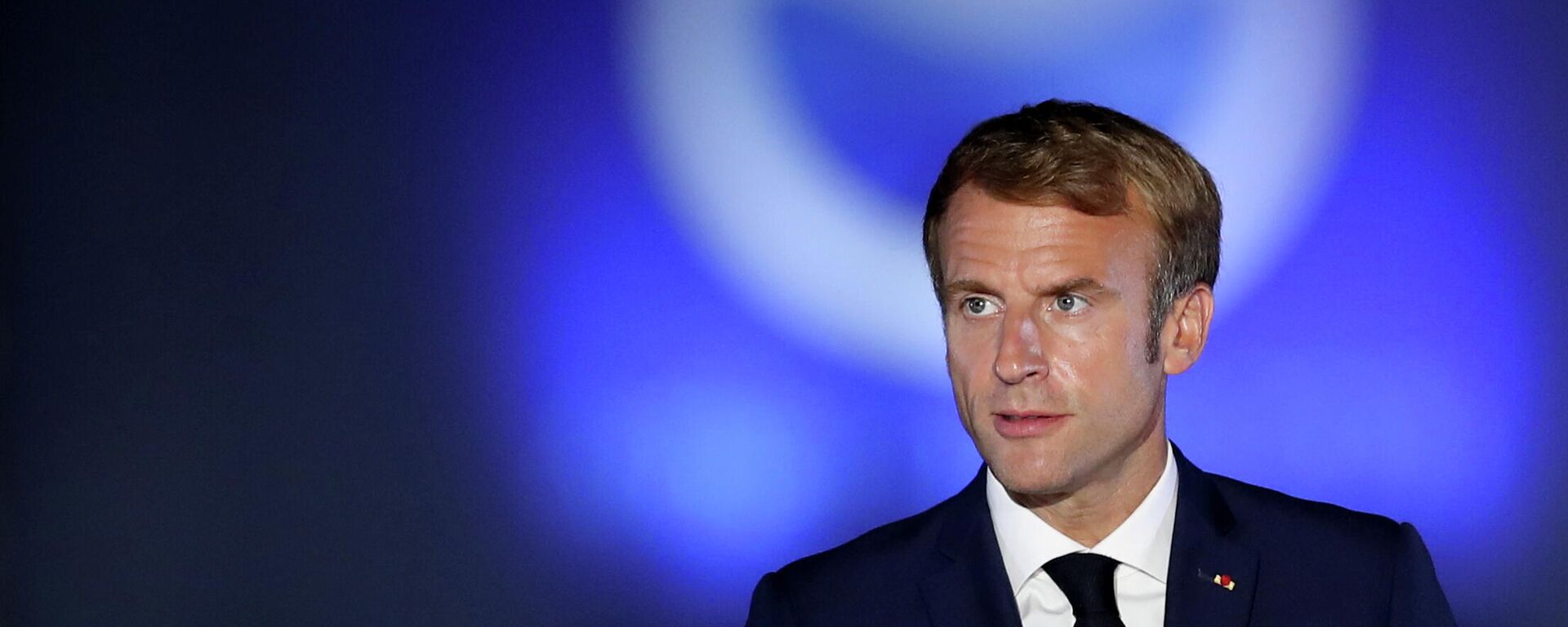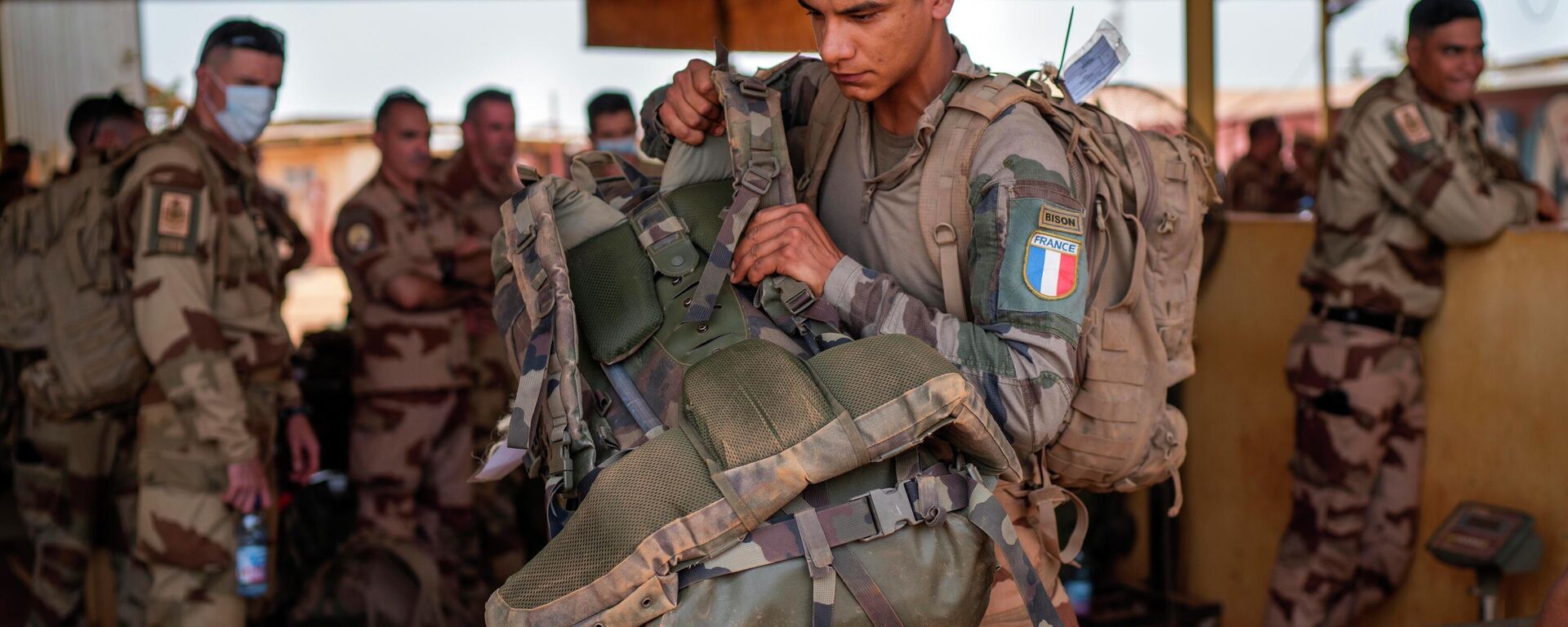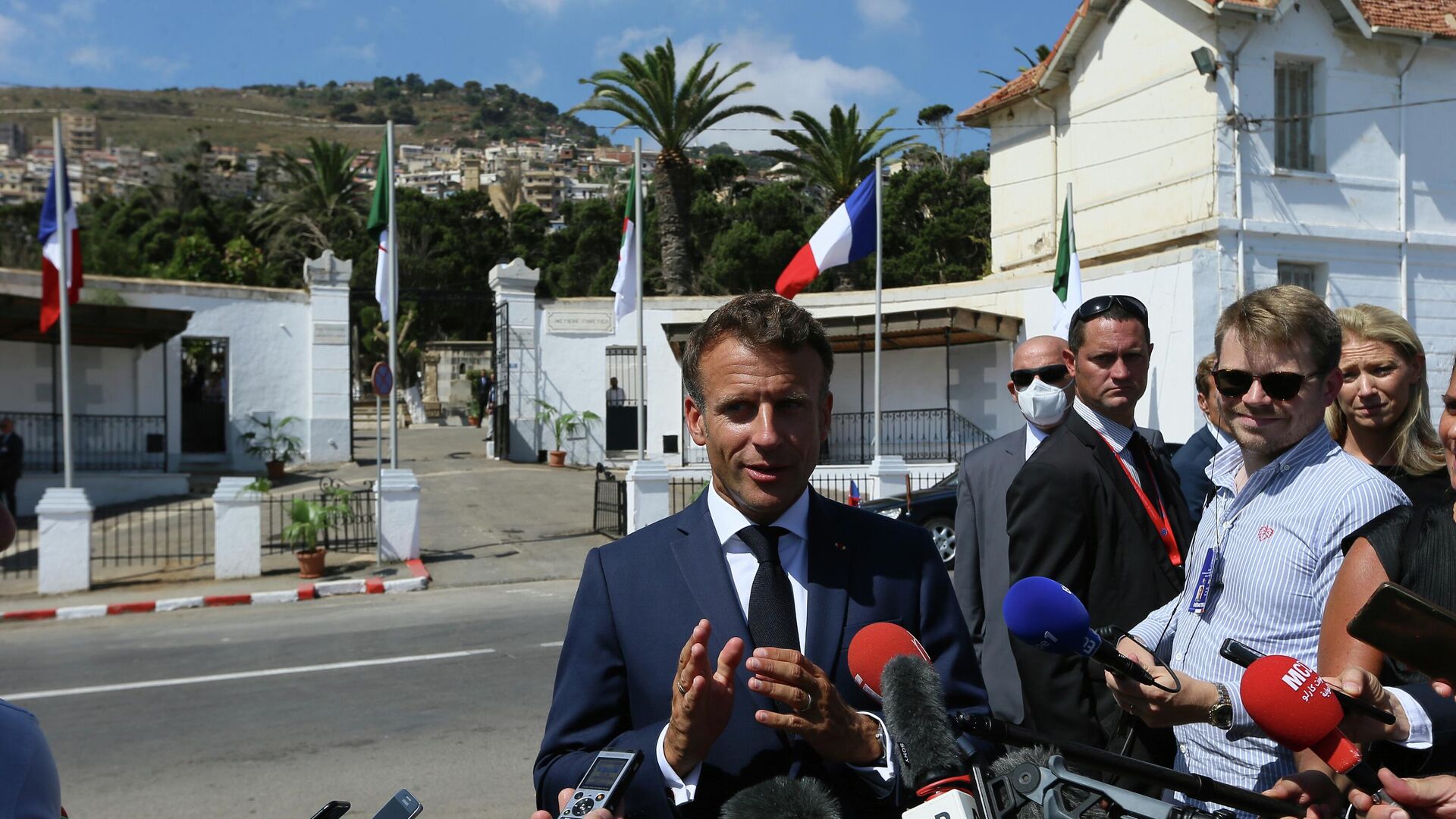https://sputnikglobe.com/20220826/macrons-visit-to-algeria-french-president-has-few-things-to-offer-security-expert-says-1100036927.html
Macron’s Visit to Algeria: French President Has ‘Few Things to Offer’, Security Expert Says
Macron’s Visit to Algeria: French President Has ‘Few Things to Offer’, Security Expert Says
Sputnik International
Relations between Paris and Algiers took a dive last year after Emmanuel Macron allegedly questioned whether Algeria had existed as a nation before the French... 26.08.2022, Sputnik International
2022-08-26T15:33+0000
2022-08-26T15:33+0000
2022-11-14T11:57+0000
algeria
mali
emmanuel macron
visit
africa
france
north africa
https://cdn1.img.sputnikglobe.com/img/07e6/08/1a/1100036155_0:86:3072:1814_1920x0_80_0_0_da3a47db619953f37f64a3409ed3418b.jpg
French President Emmanuel Macron has expressed hope that France and Algeria will be able to “look back at the past with humility” in order to establish trust and cooperation in the future.Security expert Akram Kharief, who is also the founder and moderator of the Menadefense website, told Sputnik that the French president had come to Algeria “with a list of demands” and that he has “few things to offer in return”.According to him, tensions have been exacerbated by “the height of the gas crisis [in Europe]”, the Ukraine conflict and France’s withdrawal from an anti-terror operation in Mali.The expert added that Algeria is now expecting “really concrete gestures, […] apologies,” and “firm commitments”, as well as “moral and financial reparations” from France.As for the Sahel region and Mali, Kharief went on to claim that Macron is visiting Algeria as he hopes for “closer cooperation with the Algerian Army in relation to Mali, but especially with respect to Niger, where Paris is currently trying to boost its clout.”Algeria, for its part, has its own agenda, primarily a political one, when it comes to the development of the Sahel, which is why France must adapt itself to Algeria’s demands” in this regard, the expert concluded.Relations between Paris and Algiers worsened last year when Algeria recalled its envoy to France, accusing its former colonial ruler of "genocide" amid reports that President Emmanuel Macron claimed that Algiers' “political-military system” had rewritten the country’s history to foment “hatred towards France”.Algeria gained its independence from France following an eight-year war, which ended with the signing of the 1962 Evian Accords that granted Algeria the right to self-determination. Shortly thereafter, 99.7% of Algerians voted for independence.As far as Mali is concerned, France withdrew its troops from the West African nation earlier this month, bringing its anti-terror Operation Barkhane, which kicked off in 2017, to a close, and relocating its headquarters to Niger.French Minister of the Armed Forces Sebastian Lecornu pledged that “France's commitment to the fight against terrorism in the Sahel will continue,” adding that “this is the meaning of the new agenda that Emmanuel Macron wishes with Africa, which will be based on reinforced cooperation with the countries of the area,” such as Niger.The remarks came as Malian Foreign Minister Abdoulaye Diop accused France of supporting terrorist groups inside the country, arguing that French aircraft have illegally crossed Malian airspace more than 50 times since the beginning of 2022.The Sahel region of Africa is located immediately south of the Sahara and includes parts of Mali, Niger, Mauritania, Senegal, Guinea, Burkina Faso, Chad, Nigeria, and Cameroon.
https://sputnikglobe.com/20211005/macron-hopes-france-algeria-tensions-to-cool-down-1089680800.html
https://sputnikglobe.com/20220818/amid-malis-meddling-claims-france-admits-still-has-3000-troops-in-africas-sahel-region-1099739716.html
algeria
mali
africa
france
north africa
Sputnik International
feedback@sputniknews.com
+74956456601
MIA „Rossiya Segodnya“
2022
Sputnik International
feedback@sputniknews.com
+74956456601
MIA „Rossiya Segodnya“
News
en_EN
Sputnik International
feedback@sputniknews.com
+74956456601
MIA „Rossiya Segodnya“
Sputnik International
feedback@sputniknews.com
+74956456601
MIA „Rossiya Segodnya“
algeria, mali, emmanuel macron, visit, france, north africa
algeria, mali, emmanuel macron, visit, france, north africa
Macron’s Visit to Algeria: French President Has ‘Few Things to Offer’, Security Expert Says
15:33 GMT 26.08.2022 (Updated: 11:57 GMT 14.11.2022) Relations between Paris and Algiers took a dive last year after Emmanuel Macron allegedly questioned whether Algeria had existed as a nation before the French colonial invasion. In response, Algeria recalled its envoy, citing "inadmissible" remarks.
French President Emmanuel Macron has expressed hope that
France and Algeria will be able to “look back at the past with humility” in order to establish trust and cooperation in the future.
Speaking to reporters shortly after arriving in Algeria on Thursday for a three-day visit, Macron added, “We have a complex, painful common past. And it has at times prevented us from looking to the future.”
Security expert Akram Kharief, who is also the founder and moderator of the Menadefense website, told Sputnik that the French president had come to Algeria “with a list of demands” and that he has “few things to offer in return”.
“The visit comes amid tensions between the two countries over the issue of historical memory and last year's statements by President Macron that there was no history of Algeria prior to French colonization,” Kharief said.
According to him, tensions have been exacerbated by “the height of the gas crisis [in Europe]”, the Ukraine conflict and
France’s withdrawal from an anti-terror operation in Mali.
The expert added that Algeria is now expecting “really concrete gestures, […] apologies,” and “firm commitments”, as well as “moral and financial reparations” from France.
“We must not forget that one and a half million Algerians died,” Kharief said, in an apparent reference to the death toll from the 1954-1962 war of independence that Algeria waged against colonial-ruler France. He also suggested that Macron had decided to visit Algeria “to buy time”.
As for the Sahel region and Mali, Kharief went on to claim that Macron is visiting Algeria as he hopes for “closer cooperation with the Algerian Army in relation to Mali, but especially with respect to Niger, where Paris is currently trying to boost its clout.”

5 October 2021, 12:07 GMT
Algeria, for its part, has its own agenda, primarily a political one, when it comes to the development of the Sahel, which is why France must adapt itself to Algeria’s demands” in this regard, the expert concluded.
Relations between Paris and Algiers worsened last year when Algeria recalled its envoy to France, accusing its former colonial ruler of "genocide" amid reports that President Emmanuel Macron claimed that Algiers' “political-military system” had rewritten the country’s history to foment “hatred towards France”.
Algeria gained its independence from France following an eight-year war, which ended with the signing of the 1962 Evian Accords that granted Algeria the right to self-determination. Shortly thereafter, 99.7% of Algerians voted for independence.
As far as Mali is concerned, France withdrew its troops from the West African nation earlier this month, bringing its anti-terror Operation Barkhane, which kicked off in 2017, to a close, and relocating its headquarters to Niger. French Minister of the Armed Forces Sebastian Lecornu pledged that “France's commitment to the fight against terrorism in the Sahel will continue,” adding that “this is the meaning of the new agenda that Emmanuel Macron wishes with Africa, which will be based on reinforced cooperation with the countries of the area,” such as Niger.

18 August 2022, 18:38 GMT
The remarks came as Malian Foreign Minister Abdoulaye Diop accused France of supporting terrorist groups inside the country, arguing that French aircraft have illegally crossed Malian airspace more than 50 times since the beginning of 2022.
“The government of Mali has several pieces of evidence that these flagrant violations of Malian airspace were used by France to collect intelligence for the benefit of terrorist groups operating in the Sahel and to drop arms and ammunition on them,” Diop asserted in a letter to the UN Security Council, a copy of which was obtained by Sputnik.
The Sahel region of Africa is located immediately south of the Sahara and includes parts of Mali, Niger, Mauritania, Senegal, Guinea, Burkina Faso, Chad, Nigeria, and Cameroon.




